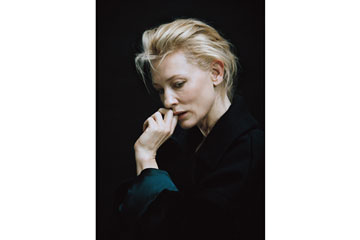
Cate Blanchett, the leading lady in Woody Allen's Blue Jasmine.
Call her Jasmine, as in the night-blooming flower. Tall and chic, with cheekbones that deserve a Keatsian ode, she could be the apotheosis or cartoon of the urban sophisticate. When she orders her "Stoli martini with a twist of lemon" in the throaty voice that Tom Wolfe described as the "New York Social Baritone," she cows everyone in sight and likes it that way. On the phone, she is not above asking, "Can you just put someone on who speaks better English?" This odd goddess, displaced from haute Manhattan to working-class San Francisco, can be as annoying as she is alluring. But fascination triumphs because, in Woody Allen's Blue Jasmine, she is played by Cate Blanchett.
Woody Allen films are thought to be defined by the author's voice--whiny, cutting, querulous and, of course, male--from his '60s stand-up routines and his early comedies. But Allen, who as writer, director and often star has averaged a movie a year since his auteur debut with Take the Money and Run in 1969, quickly matured to make films that can't easily be pegged as comedies or dramas; any of his pictures may owe as much to Ingmar Bergman as to Billy Wilder. "This is the guy who directed Bananas and Interiors," Blanchett notes, "so, in terms of tone, the field is wide open." And in terms of voice, his most memorable ones are often female.
Following the dictum "write what you know," Allen observed the women he lived with and loved, and he turned his take on their personalities into film fiction. Diane Keaton's warm, slightly addled cheerfulness gave a fresh '70s bounce to Love and Death and Annie Hall. Mia Farrow, his long-term wife equivalent, anchored Allen's '80s films as a wispy creature with heroic resources. The knowing intimacy of these movies allowed the viewer to think they were snapshots of Woody and his women, just in costume and with the names changed. That inference helped stoke the shock of the revelation, in 1992, that Allen had left Farrow to take up with her adopted daughter Soon-Yi. (They are still together, in Allen's longest romantic relationship.)
O.K., so the heart wants what it wants. But putting aside the dime-store psychologizing to look at the actual work, anyone could acknowledge that Allen, at 77, is America's premier writer-director of women's films. In an age when Hollywood focuses on superheroes and bromances, he has probed the slow-roiling tensions in a clan of sisters (Interiors, Hannah and Her Sisters); constructed roundelays of infidelity (Manhattan, Crimes and Misdemeanors), with the sympathy going to the females; and analyzed pained women in crisis (Alice, Melinda and Melinda).
For gracing his films, actresses have earned five Oscars and 11 nominations. Blanchett should be on that track with Jasmine--one of Allen's most troubled and troubling women.
